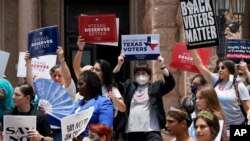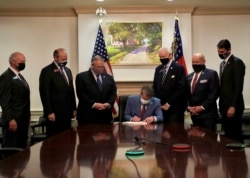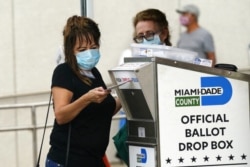“It’s impossible to overestimate how harmful this [election reform] bill is,” Texas State Representative Nicole Collier told VOA, “Republicans in this state and across the country are chipping away at our freedom to vote.”
Collier was referring to a controversial bill promoted by state Republican lawmakers and Gov. Greg Abbott that would make it more challenging for Texans to vote by mail, ban drive-through voting, and give more power to partisan poll-watchers, among other provisions. Collier and her Democratic colleagues recently fled the state to prevent the Republicans from voting on the measure.
But she could have been referring to scores of other measures approved or under consideration in legislatures throughout the U.S. -- bills denounced by Democrats as assaults on democracy but praised by Republicans as much needed reforms in the wake of the highly contested results of the 2020 presidential election.
In fact, 49 of America’s 50 states have seen legislation introduced that would constrain ballot access relative to what was allowed during the 2020 presidential election, when many states relaxed rules and expanded opportunities to cast ballots during the pandemic.
Jay Williams lives in Georgia and has consulted for top GOP politicians. His belief, one shared by many Republicans, is that Democrats’ agitated and panicked response to new voting laws is politically motivated.
“I haven’t seen a single provision that limits the right of an individual to vote,” he told VOA. “If someone wants to vote, our new law still gives them many ways to do that.”
Coincidentally, this week is the 56th anniversary of the pivotal Voting Rights Act (VRA) of 1965, which prohibited discriminatory voting practices targeting minority voters - such as literacy tests and poll taxes - that many southern states adopted after the Civil War.
While many Republicans echoing former President Donald Trump’s false claim that the 2020 election was rigged say they seek to ensure election integrity, Collier and others see the introduction of restrictive voting bills as an attack on the legacy of the VRA and the rights of minority Americans it was created to protect.
Outnumbered in the state’s legislature, Collier and her Democratic colleagues took the unusual step of fleeing Texas on July 12 for Washington, D.C., where they have lobbied lawmakers to enact federal legislation to expand voting access nationwide. By leaving Texas, they deprived the state’s House of Representatives of a quorum needed to vote on the restrictive voting bill, effectively stalling it. Democrats do not plan on returning until the current House session is adjourned early this month.
“We tried to work with Republicans to amend the bill, but they didn’t seem interested,” Collier explained. “We didn’t have any other options, but the right to vote is too important not to fight for.”
Across the country, Republican lawmakers have presented 361 such bills, according to a March report by the Brennan Center for Justice at New York University.
Those efforts have been most pronounced in Texas, Georgia and Arizona, where 49, 25 and 23 restrictive voting provisions have been introduced, respectively. All three states have been Republican strongholds for decades. But Democrat Joe Biden narrowly carried Georgia and Arizona in the 2020 presidential contest, and Democrats have come within a few percentage points of recording upsets in several statewide races in Texas in recent years.
“These are former Republican-leaning states that have either turned to Democrats, or are on their way to doing that,” Arizona voter Suk Moon told VOA. “Republicans in those states know they can’t win elections because of changing demographics, so they’re trying to stay in power by making it harder for those who traditionally support Democrats to vote.”
What these laws would do
Republicans dispute such claims and maintain the bills they champion are necessary to prevent voter fraud.
In Georgia, for instance, Republican Governor Brian Kemp argued that the bill the state adopted in March doesn’t outlaw ballot drop boxes but merely ensures “drop boxes are used in a secure manner.”
Kemp added, “To say that this is restricting things I really think is a little bit unjust.”
Republicans contend that restoring the public’s faith in the electoral system is especially important after the 2020 presidential contest. To this day, Trump maintains he was denied a second term not by the will of voters but as a result of massive fraud and chicanery.
“And it’s true that nearly 3 of 4 Republican voters incorrectly believe the election was stolen from former President Trump,” said University of Georgia political scientist Charles Bullock, “but that’s because Republicans planted those seeds by lying to their voters.”
Still, the GOP currently controls both chambers of 30 state legislatures. So far, 18 have managed to pass restrictive voting laws, including Arizona and Georgia.
The exact provisions vary by state, but the new laws range from limiting the early voting window and restricting how people can cast their ballot, to requiring specific forms of identification and amending who oversees elections.
In the case of Georgia - where Trump implored the state’s secretary of state to overturn the 2020 election - the new SB 202 law empowers a Republican-controlled commission to remove election officials. They have already used their new authority to do so.
Democrats worry provisions like this will allow Republican lawmakers to flip closely contested elections. Collier understands modern-day voter suppression might not be as blatant as literacy tests and poll taxes, but she insists it still exists if you know where to look.
“There are lots of ways to disenfranchise a person that we’re seeing in these bills,” she said. “You can move someone’s polling place, or you can take away their ballot drop box. You can create these little complicated rules that make it easier to throw out your vote, and you can make sure the people who make those decisions are partisan. You can take away the mobile voting stations that allowed so many people to vote this (past) year, and you can try to stop good Samaritans from driving people to polls. Those are all examples of voter suppression, and that’s what we’re seeing here.”
Overblown and political
Williams, the Georgia Republican political consultant, noted that any Georgia resident can request a mail-in ballot for any reason, that there are required weekend early voting days, and that drop boxes are mandatory.
“In a lot of ways,” he said, “it’s easier to vote in Georgia than in other parts of the country.”
The issue of the drop boxes is a microcosm of the different interpretations Republicans and Democrats are applying to the new laws. Williams points out that there was no drop box requirement before 2020. In his view, that every county in the state must have one is an improvement compared to pre-pandemic voting in Georgia.
Democrats, however, view the law’s limits on drop boxes as a punitive regression from their more liberal use during the 2020 election cycle. While Republicans see such limits as necessary to secure the ballots from tampering, Democrats see them as making it difficult for some Americans to vote.
“There’s a lot of hyperbole on both sides,” said Bullock, the University of Georgia professor. “Republicans say we need to protect the electoral system from fraud, and there’s no evidence of widespread cases of that. Democrats say each of these voting laws passed will stop people from voting, but that’s not something we’ve seen either. Georgia and much of the rest of the country just voted in record numbers.”
'Voting shouldn’t be hard'
State Representative Collier agreed that voter turnout has grown but says that should be celebrated, not used as justification for barriers to the ballot.
“The only reason we’re seeing that increased turnout is because Democrats have been creative in expanding access to polls,” she said. “Now they’re restricting the mobile voting units and some of the other things we’ve done. But voting shouldn’t be hard. It should be fair, and it should be easy.”
The Voting Rights Act of 1965 took a major hit in early July. The Supreme Court voted 6 - 3 along ideological lines to overturn a federal appeals court ruling that found two Arizona voting laws unconstitutional. One law banned the collection of absentee ballots by anyone other than a relative or caregiver. The other disqualified any ballot cast in the wrong precinct.
The federal appeals court said both provisions would have a disproportionate impact on minority voters, and that there was no evidence of voter fraud to justify their use. The Supreme Court disagreed. Justice Alito wrote for the majority that just because voting might be “inconvenient for some,” doesn’t mean access is unequal.
Bullock said it’s difficult to guess what might happen as a result of these more restrictive voting laws. While voter turnout has continued to increase in the face of legalized barriers, there’s no guarantee that will continue.
“Georgia was determined by 12,000 voters,” he said of the 2020 presidential election. “That’s nothing! It’s possible any of these new restrictions can provide just enough of an impediment to flip a close race. But it’s also possible these restrictive measures are backfiring on Republicans by motivating Democrats to the polls.”
But for Representative Collier, it’s not about predictions. It’s about making it easy for Americans to vote.
“We saw what happened in 1965 when our federal government protected the right of people to vote,” she said of the Voting Rights Act. “The percentage of voters - especially minority voters - skyrocketed. We need the federal government to act again to protect that most important right to vote.”
Editor's note: This story was corrected to note that 49 states have introduced legislation that would constrain ballot access relative to what was allowed during the 2020 presidential election.









